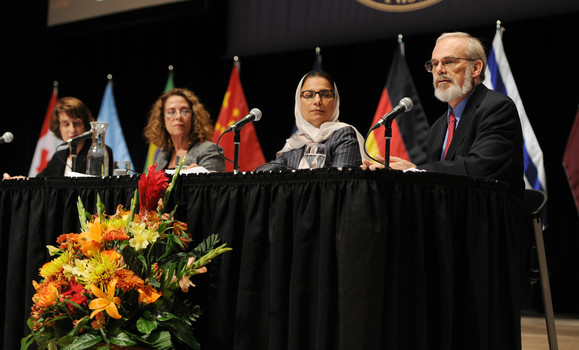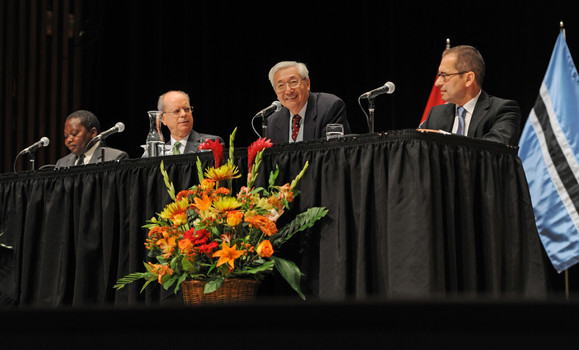Dal hosted a global conversation Friday morning as leaders of eight different post-secondary institutions from around the world discussed the future of universities.
With new Dal President Richard Florizone listening intently on stage, the panel included presidents, former presidents and chancellors, each with a unique perspective on the state of post-secondary education in the early 21st century.
The guests were in Halifax as part of the proceedings for Dr. Florizone’s installation, and each was presented with an honorary doctorate from Dalhousie in the afternoon ceremony.
More Dal News coverage: "A presidential welcome"
“They are visionaries and pioneers,” said Dr. Florizone. “They’re people who’ve found innovative ways to respond to challenges facing modern universities.”
The institutions represented on stage ran the gamut of shapes and sizes: from an growing institution in a developing African country, to one of Europe’s emerging liberal arts universities, to a U.S. school world-renowned for technology and innovation.
Read: Biographies of all eight leaders
The exchange of ideas, facilitated by Dal Vice-President Research Martha Crago, offered insight into post-secondary teaching, research and administration on a global stage. And by bringing global perspectives to Dal — and, in return, sharing Dal’s perspective with the world — the discussion offered up ideas and issues for the Dal community to consider as the university’s focus becomes increasingly international.
Local impact, global reach
If there was a dominant theme of the discussion, it was that universities looking to make a mark on the world stage need to balance global reach with local impact — and that the relationship between the two is deeply intertwined.
“It’s what it’s all about,” said Marie-Christine Lemardeley, chancellor of the Université Sorbonne Nouville (Paris 3) in France, when asked about increasing international collaboration.
“It’s all about being ‘glocal’ — that is to say, global and local — offering students and researchers from all over the world the opportunity to experience firsthand what local societies and communities have to offer. This contact with local reality and universal thinking breeds open-mindedness, the driving force behind intellectual strength.”

Rivka Carmi, president of Israel’s Ben-Gurion University of the Negev, advised that universities focus on unique local strengths that can connect with global interests.
“What are the strengths in teaching and research, and what are the most attractive topics and issues that fall with the local needs, but also can attract the international interest from faculty, students and — what I think is more important — the level of collaboration between universities?” she asked.
The panel all seemed to agree that mobility — of people and ideas — is going to be key for the universities in the future.
“Active international exchange and collaboration is very important if we want to become international leaders,” said Xu Zhihong, past president of China’s Peking University. “That’s why we really paid more attention in the past 20 years to stimulate professors, get more international collaboration and active undergraduate student exchange.” He emphasized the importance for both students and faculty to have “a global vision.”
But Qatar University’s Sheika Abdulla Al-Misnad cautioned universities to ask the right questions when thinking internationally.
“Globalization should not be an aim; …it’s a process,” she said. “It’s how universities are influenced by what’s happening. It should not be an aim for a university to be ‘global’ unless it defines what ‘global’ means to that university.”
Technology and research
Another topic of discussion was how technology will impact the university of the future, with a wide variety of predictions. M.I.T. Chancellor Eric Grimson described a future where students would sit in on lectures from around the world but then apply that knowledge in local learning communities at their own institutions.
“Every institution of higher learning then has an opportunity to bring back in the local expertise, to put the local colour and flavor on it: flipping the classroom and enabling faculty to focus on active learning; group problem-solving; amplification of foundational material with practical exploration; and, especially, leading the dialogue in the local community about where that matters,” he said.

The University of Botswana's Bojosi Otlhogile, a past vice-chancellor, described technology as both a challenge and an opportunity but expressed skepticism in the idea that technology can be a substitute for campus life. “Technology will be an enabler but, in my view, will not replace campus experience. What is required of us is to blend technology we have with the campus experience that is available in all our universities,” he said, giving the example of how distance education allows students in Botswana caring for with dependents with H.I.V. to continue their studies.
The panelists also had different perspectives to share when asked about the balance between “basic” or “foundational” research and applied research. The subject was of particular interest to Joaquim Clotet Marti, rector of Pontifical Catholic University of Rio Grande do Sul in Brazil, given that his school is home to one of the first incubator/accelerator technology parks in his country.
“New knowledge is the most important factor in economic growth, and the role of the university in developing new industries and generating regional growth is evident nowadays,” he said. “The contribution of the entrepreneurial professor, consulting and working closely with business, is currently a new paradigm.”
Gerhard Fouquet, president of Christian-Albrechts-University at Kiel, Germany, was one of several who questioned the binary between basic and applied research, arguing “both aspects of research… are needed and mutually reinforcing.”
“But universities should recall that they have to provide and maintain freedom of each researcher and therefore also the lack of any enforcing event which might be used in the future but wasn’t planned for it,” he added.
Advice for Dal’s new president
In addition to the prepared questions, the panelists also addressed questions submitted from the audience, both in person and remotely from those watching the webcast or the live broadcast in Truro. The university leaders discussed women in leadership in higher education, tackling change within the institute, and university rankings.
For their final statements, the panelists offered words of advice for Dr. Florizone. The advice ranged from thinking of universities like a jigsaw puzzle — “every piece matters and every piece must be taken into account” — to leading with enthusiasm. (Dr. Florizone collected pieces from each advice and shared them Friday on his 100 Days of Listening Tumblr.)
You can watch the full panel discussion on YouTube. See below for a time index of particular discussion topics.
- 7:15 - What accomplishment are you most proud of, and what keeps you up at night?
- 40:25 - Establishing universities on the global stage
- 49:14 - Achieving both local and global mission
- 59:15 - What would a “global university” of the future look like?
- 1:07:29 - The challenges and opportunities of technology in learning
- 1:19:03 - Balancing applied and foundational research
- 1:46:40 – Global university rankings
- 1:51:55 – Women in senior university roles
- 1:57:58 – The role of the university president in facilitating change
- 2:01:45 – The “corporatization” of universities
- 2:06:20 – Responsibility of universities to act with vision in their communities
- 2:09:10 – Balancing top-down and bottom-up leadership
- 2:11:55 – Faculty freedom in choosing research projects
- 2:14:25 – The role of technology parks
- 2:17:37 – Closing question: advice for Dr. Florizone
Full installation coverage
- Installation ceremony: "A presidential welcome"
- Video: Dr. Florizone's Installation address

